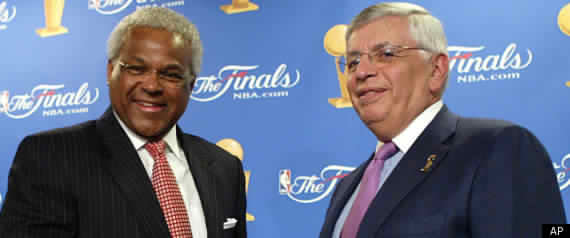The following blog post was brought to you from Trey Jones, Editor-In-Chief of I Ball for Real. The article is based on his opinion as a sports enthusiast and may not reflect those of Lip Service: News with Attitude, although we felt he made valid points and don’t mind sharing our platform.
By Trey Jones.
As we are just a week into the NBA lockout, perhaps the most fascinating subplot (and probably the most impactful) is the ongoing P.R. battle between the NBA and the player’s union to win the sentiment of the fans, in an effort not to lose the tons of good will earned after what most observers (and TV ratings confirm) believe was the most exciting NBA season since Michael Jeffrey Jordan and the Chicago Bulls lorded over the Association.
Traditionally, in labor negotiations, fans tend to side more towards owners, and don’t believe for a second that the bosses don’t know this. Commissioner David Stern has an amazing ability to distort reality in order to paint his bosses — the owners — as poor victims, as evidenced by his framing of the NBA’s latest proposal. This proposal would have, in the commissioner’s words, “guaranteed the player’s union $2 billion” over the life of a 10-year deal, but ultimately cost them about $8 billion in that span.
Sekou Smith, on his NBA.com Hang Time blog, asked Los Angeles Lakers veteran and NBAPA President Derek Fisher specifically about the owners’ offer and what he would say to fans who presumably wouldn’t understand why the players would turn down $2 billion guaranteed:
What do you say to fans who want to know why the players wouldn’t accept a $2 billion guarantee, which would be a small cut but would still leave them the highest-paid union in professional sports?
FISHER: “It’s tough to respond in a vacuum. … Our position would still remain the same in terms of it’s not always just the economics; it’s the system within how those economics fall. The difference between being guaranteed a certain amount of pay but under a certain system, players aren’t guaranteed that amount of money individually. On a collective, it’s one thing and on an individual basis, it’s another. The amount of money that players make in the NBA or in most professional sports situations is always tied to the revenue that the sport is bringing in. … Players’ salaries don’t just increase to this arbitrary, astronomical level without the revenues matching that growth. … It’s not so much just the number. If you look at the 10-year deal that they are proposing, there isn’t an industry in the world that would agree to a 10-year wage freeze.”
Fisher makes a great point that drops a huge bomb to the long-standing criticism that professional athletes make too much money and should have no problem giving some back to the NBA (to offset the losses pound-foolish owners have incurred over the last half-decade, mostly due to their own overzealous spending.) Players’ salaries are tied directly to the league’s revenue, so resenting athletes for the money they make while propping up the popularity of the NBA (and NFL to a much larger extent) is highly counterproductive.
Which leads me to a few perplexing questions: Why is it exactly that people resent professional athletes for their high salaries? What checkpoint do fans actually start this resentment toward athletes? Is it Draft Night? Second contract? And what distinguishes the players’ “greed” from the owners’?
The comments left in the linked-above blog post is a cesspool of blame aimed square at the Players Association. Commenter after commenter cite the bad economy and the players’ already-high salaries (which were collectively bargained during the last two CBA negotiations in 1999 and 2005) as reasons why the union should cave in to the owners’ demands in order to secure that next season starts on time and that no one has to address the 30 elephants in the room crying broke while falling over themselves to sign mid-level guys to the same long-term contracts that they are now claiming broke the system.
Why casual fans choose not to take the owners to task regarding these lockouts is beyond me. You criticize an employee for being overpaid, but gloss over the employer who offered the contract? Players don’t sign themselves, ladies and gents, and they damn sure don’t turn down big money – especially considering the fact that professional athletes have such a limited amount of years to maximize their earning potential.
I’m not trying to tell you whose side to be on during these NBA and NFL lockouts (of course, if you’re a working class employee and you’re on the side of management, you may need to take a long, hard look at your life and where it went wrong), but fans owe it to ourselves to be educated about the issues involved in the labor negotiations instead of relying on pre-conceived perceptions usually preordained for one side.

